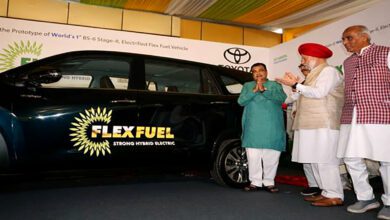Union Minister for Road Transport and Highways, Nitin Gadkari has emphasized on adoption of alternative fuels which will be import substitute, cost-effective, pollution-free, and indigenous and discouraged the use of petrol or diesel as a fuel. Addressing ‘Indian Sugar Mills Association (ISMA)’ Conference on ‘Alternative fuel- Road ahead’ he said that biggest benefit of Bio- ethanol as alternative fuel is that it is a clean fuel with very low greenhouse gas emissions. He said the additional income that is generated is directly diverted to the farmers, which empowers the rural and backward economy.
Gadkari said looking at the ethanol production capacity and its adoptability as a fuel, the government has redesigned and launched the E-20 fuel program which will ensure the use of bio-ethanol in 20% blend with Petrol by 2025 in India. He said government has also calculated that to achieve 20% ethanol blending, the country will require around 10 billion litres of ethanol by 2025. He said currently, the sugar industry contributes to 90% of ethanol demand as a blended fuel in the country.
He said he keeps on doing research to find ways to increase ethanol production with available resources and one such proposal is to add 15% to 20% sugar into B-Heavy Molasses. He said this will have multiple benefits as it will utilise an excess stock of around 45 to 60 Lakh Metric Tonnes of Sugar and will improve the ethanol recovery by 30% due to better quality of raw material.
On similar lines, the Minister said production of C-Heavy Molasses from sugar can be discouraged which will standardise the production of B-Heavy Molasses and will permanently lead to lesser production of sugar by 1.5% per Metric Tonne of Sugarcane.
Gadkari said all of these steps will increase the production of ethanol and can lead to a scenario where excess availability of ethanol in one state can be transported to ethanol-deficient states such as the North-East and Jammu-Kashmir and Ladakh. Bio-ethanol can also be a sustainable fuel for aviation purpose. as it can provide 80% savings on greenhouse gas emissions and can be blended up to 50% with conventional jet fuels without any modification. It is already been tested and approved by the Indian air force. With the rollout of flex-fuel vehicles on 100% bio-ethanol, the demand for ethanol will immediately jump by 4 to 5 times.













